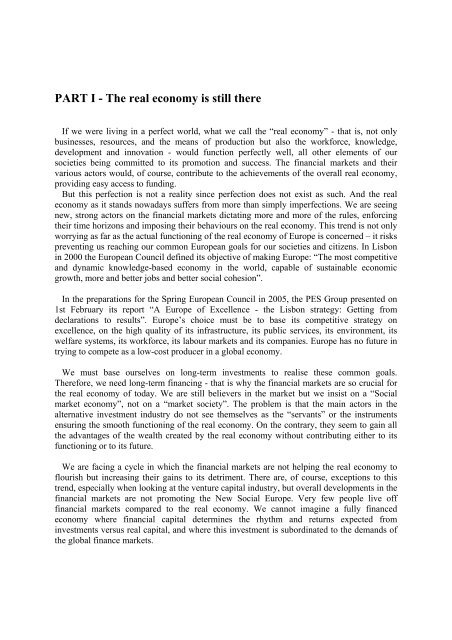Executive summary - Udo Bullmann
Executive summary - Udo Bullmann
Executive summary - Udo Bullmann
- No tags were found...
You also want an ePaper? Increase the reach of your titles
YUMPU automatically turns print PDFs into web optimized ePapers that Google loves.
PART I - The real economy is still thereIf we were living in a perfect world, what we call the “real economy” - that is, not onlybusinesses, resources, and the means of production but also the workforce, knowledge,development and innovation - would function perfectly well, all other elements of oursocieties being committed to its promotion and success. The financial markets and theirvarious actors would, of course, contribute to the achievements of the overall real economy,providing easy access to funding.But this perfection is not a reality since perfection does not exist as such. And the realeconomy as it stands nowadays suffers from more than simply imperfections. We are seeingnew, strong actors on the financial markets dictating more and more of the rules, enforcingtheir time horizons and imposing their behaviours on the real economy. This trend is not onlyworrying as far as the actual functioning of the real economy of Europe is concerned – it riskspreventing us reaching our common European goals for our societies and citizens. In Lisbonin 2000 the European Council defined its objective of making Europe: “The most competitiveand dynamic knowledge-based economy in the world, capable of sustainable economicgrowth, more and better jobs and better social cohesion”.In the preparations for the Spring European Council in 2005, the PES Group presented on1st February its report “A Europe of Excellence - the Lisbon strategy: Getting fromdeclarations to results”. Europe’s choice must be to base its competitive strategy onexcellence, on the high quality of its infrastructure, its public services, its environment, itswelfare systems, its workforce, its labour markets and its companies. Europe has no future intrying to compete as a low-cost producer in a global economy.We must base ourselves on long-term investments to realise these common goals.Therefore, we need long-term financing - that is why the financial markets are so crucial forthe real economy of today. We are still believers in the market but we insist on a “Socialmarket economy”, not on a “market society”. The problem is that the main actors in thealternative investment industry do not see themselves as the “servants” or the instrumentsensuring the smooth functioning of the real economy. On the contrary, they seem to gain allthe advantages of the wealth created by the real economy without contributing either to itsfunctioning or to its future.We are facing a cycle in which the financial markets are not helping the real economy toflourish but increasing their gains to its detriment. There are, of course, exceptions to thistrend, especially when looking at the venture capital industry, but overall developments in thefinancial markets are not promoting the New Social Europe. Very few people live offfinancial markets compared to the real economy. We cannot imagine a fully financedeconomy where financial capital determines the rhythm and returns expected frominvestments versus real capital, and where this investment is subordinated to the demands ofthe global finance markets.





